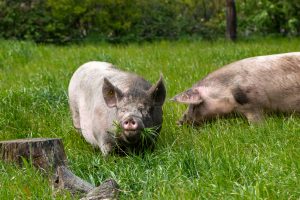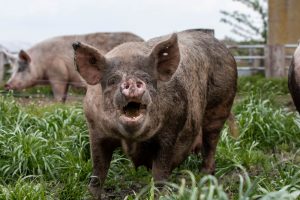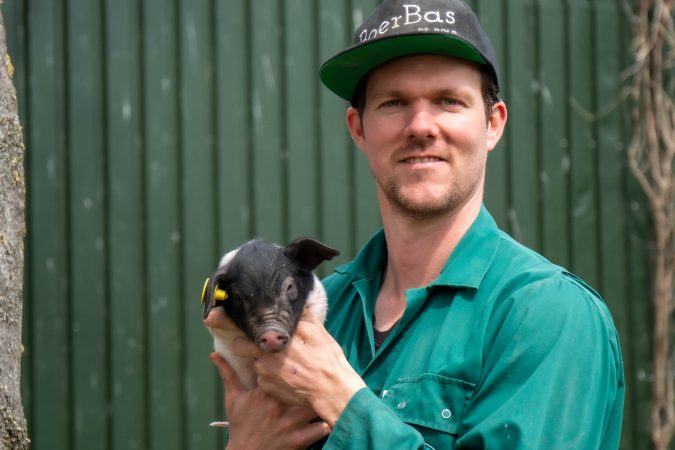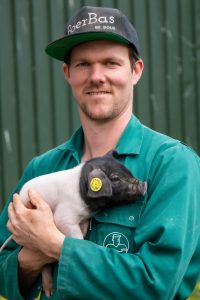Near the Dutch village of Rucphen, we find Bas Antonissen’s farm. A farm that has been in the family since 1950, but almost eight years ago Bas and his parents, Guus & Anja, switched to organic farming. This is BoerBas’ story.
 At the organic farm of BoerBas in Rucphen (North Brabant, the Netherlands), about 80 sows and 540 fattening pigs roam. They are all born on the farm, where they are kept completely organically until they are allowed to go to the slaughterhouse. The choice for organic came as a reaction to traditional pig farming, a branch in which Bas grew up. “The farm was originally started by an uncle of my father’s, around 1950. Pigs were kept here and he also grew strawberries. Around his 20th birthday, my father got into pig farming and took over that branch on the farm”, Bas explains.
At the organic farm of BoerBas in Rucphen (North Brabant, the Netherlands), about 80 sows and 540 fattening pigs roam. They are all born on the farm, where they are kept completely organically until they are allowed to go to the slaughterhouse. The choice for organic came as a reaction to traditional pig farming, a branch in which Bas grew up. “The farm was originally started by an uncle of my father’s, around 1950. Pigs were kept here and he also grew strawberries. Around his 20th birthday, my father got into pig farming and took over that branch on the farm”, Bas explains.
Bas joined the farm in 2009, filled with ambition and eager to work. He could not, however, agree with what pig farming had become in recent years: “The rat race in pig farming was already in full swing at that time. Over time, I developed an aversion to that and asked myself: is this really what we want, more pigs and even more specialisation?”
It took another two years for the ‘green ball’, as he calls it, to start rolling, but the first steps had already been taken. By 2012, the plan for conversion was ready and by the following year, the farm was ready to make the switch. Today, Guus and Bas keep 80 sows in a closed pig farm in Rucphen: “and by ‘closed’ we mean: all piglets that are born also stay on the farm until they are ready for slaughter.”
The sows have access to 1 hectare of organic land attached to the farm for free-ranging from 1 April to 1 November, and also have access to a mud puddle which was awarded the prize of “most beautiful mud puddle in the Netherlands” in 2018.
Organic pigs
Bas’ pigs are fully organic, 100% certified according to the organic legislation. What’s more, the farm also adheres to the values of the “Groene Weg” chain. In concrete terms, this means: no artificial fertilizers, no pesticides and no GMOs; all pigs, including the smallest, have access to an outdoor area at all times; an indoor pen is always available, half of which has a solid floor with organically grown litter; the tails are not cut and no preventive antibiotics are used.
The manure produced by the pigs is also labelled “organic”. “This goes mainly to two organic arable farmers in the area”, Bas knows, “they use the manure to grow their crops. Crops I buy back from them during harvest for the pigs’ beds, closing the loop.”
 Reactions
Reactions
The switch to organic was very well received by the municipality and the public, who, according to Bas, appreciate the animals’ welfare, living conditions, outdoor area and smaller numbers.
“By keeping less animals in the pens, the pigs have up to three times more space than before. In addition, they straw bedding, their curly tails are left untouched, they receive feed that is grown without the use of artificial fertilizers or chemical pesticides and no unnecessary medication.”
De Groene Weg (the green way)
BoerBas sells its meat through De Groene Weg, although a small part of the meat is also sold directly on the farm. De Groene Weg is an organic chain and a social enterprise, where Bas and other organic pig farmers are members of the Suppliers Association. De Groene Weg distributes the meat to consumers looking for organic food. “We organize ourselves through the association, so that supply and demand are brought together with De Groene Weg. They have 11 butcher shops in different cities throughout the Netherlands and an online shop”
“The trick for us, as farmers, is getting a fair price for our produce,” Bas continues. “For me, De Groene Weg is the link between BoerBas and the organic consumer in the ‘big city’.”
Meat & Greet
BoerBas stands for transparent management, which is made clear on the website, where citizens can request a “Meat & Greet”. People who are curious about how things work on the farm, how the pigs live, who want to take a look at the piglets or just want to know more about organic pig farming, can drop by in May, June & July to take a look. The farm visits are on request, but free of charge, and the mudpool can also be visited.













